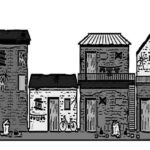I N the foreword to the White Paper on the ‘State of Law and Order in Delhi’ that was released to the media recently, the Managing Trustee of the NGO Praja says, ‘There is a crisis brewing in Delhi, a crisis that this city is becoming unlivable for the common men and women’. And, ‘this white paper for crime is a reflection of all that has gone wrong in Delhi’.
‘How long will this go on? What will it take for the Government to act? We need to see our elected representatives taking active and constant interest in on issues of Law and Order. Till this is not done we will continue to see a slide towards lawlessness in Delhi’.
I have always been intrigued by a universal paradox of democratic functioning of governments that the persons elected by popular vote in free and fair elections are totally insensitive to the wishes of the same people who voted for them. This could not be truer of the peoples’ representatives in our country. Once elected, the parliamentarians and legislators are not even accessible to their constituents. They face the payback (retribution or approbation) from the masses only after five years when the voters get another chance of passing judgment on them. In the interregnum, there is no occasion for the electorate to point out their faults and flaws or pat their backs for their strong points and good deeds. Lincoln’s adage of ‘a government of the people, for the people and by the people’ in our country is meant for school textbooks.
It is in this context that a periodic assessment of the performance of the public representatives (report card) on behalf of the citizens can be a persuasive device for improving the quality of representation. However, it would be unwise to expect the citizens to attempt such a report card. Better, the task could be taken up pro bono by some public-spirited individuals or institutions. Four years ago, Praja, a Mumbai NGO working towards enabling accountable governance, took the initiative of putting together an objective citizens’ report based on information available in the public domain supported by extensive public perception surveys in Mumbai.
I have had the occasion of attending the press launches of Praja’s reports in Mumbai. The enthusiasm generated by the reports among the Mumbai media and the civil society has been magical. And so, enthused by the success of the citizens’ reports in Mumbai, I suggested to the trustees of Praja Foundation to consider preparing similar citizens’ reports for legislators and councilors of the National Capital.
In quick succession within a period of two months, three reports were released to the media in Delhi. The first two pertained to the performance of MLAs and Municipal Councilors of NCT of Delhi. The third report was the White Paper quoted earlier. Surpri-singly, the mainstream media, which is normally enthusiastic to criticism of the establishment, took very little notice of the three events, which made fleeting appearances in the newspapers and were quickly forgotten.

In contrast, similar reports on the working of MLAs and Municipal Councilors of Mumbai by the same non-partisan NGO have been the subject of much churning among the adjudged public representatives, some of whom were brave enough to seek guidance of the NGO for improving their rankings. The report cards even led to the formulation of customised training programmes for them.
THE otherwise lively people of Delhi have not reacted vigorously to the fact that nearly 33 per cent of the MLAs who have been ranked by Praja are hardly participating in deliberations. Strangely, no social discourse has ensued on the conclusion of the report that ‘our data is showing that AAP is not being different than the other mainstream parties’. Complete silence of the social media on these developments is also puzzling.
Endpoint: The only comment comes from a distinguished police officer, who has been the leader of Delhi Police in the past. He says that Praja should have factored in the singular social, economic and geographical status of the National Capital while appraising the crime situation in Delhi. ‘Comparison between Mumbai and Delhi is like putting apples and oranges in the same basket,’ he says. I hope the reports attract more darts.
The writer was the Cabinet Secretary and the first Governor of Jharkhand. He can be reached at pkumar1511@hotmail.com































































